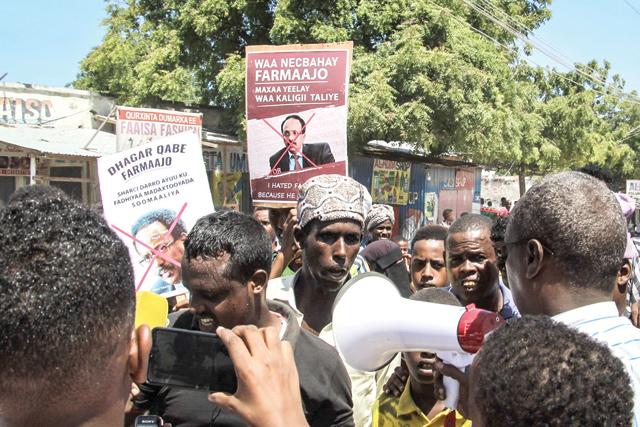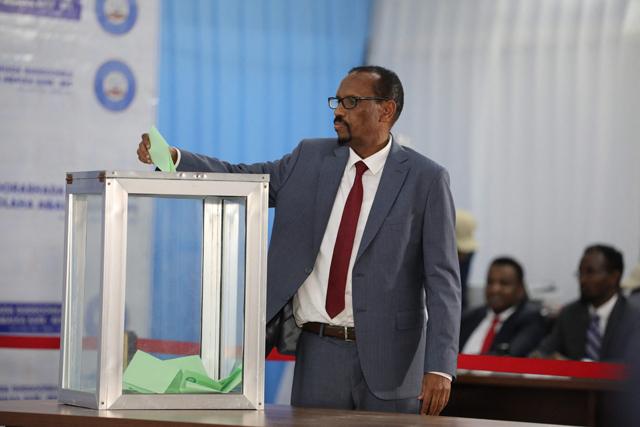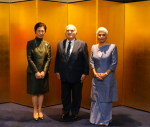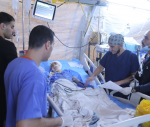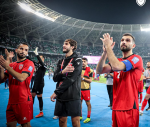You are here
Somalis flee fearing fresh violence as president loses support
By AFP - Apr 27,2021 - Last updated at Apr 27,2021

Residents start to flee from their home after recent crashes between the Somali security forces and the Somali military force supporting anti-government opposition leaders erupted over the president’s bid to extend his mandate in Mogadishu, Somalia, on Tuesday (AFP photo)
MOGADISHU — Civilians fled their homes in the Somali capital, fearing more clashes over President Mohamed Abdullahi Mohamed’s bid to stay in power, which drew criticism on Tuesday from key political allies.
Mogadishu residents piled televisions and mattresses into rickshaws, or loaded belongings onto donkeys as the city remained on a knife’s edge, with government and opposition troops boosting their military presence in different parts of the capital.
Mogadishu is witnessing its worst political violence in years after February elections were delayed and the president earlier this month extended his mandate for two years.
Months of UN-backed talks failed to overcome the election impasse, and the dispute turned violent on Sunday as forces loyal to the president traded gunfire with fighters allied to his political rivals, leaving at least three dead.
In a blow to the president, best known by his nickname Farmajo, the leaders of two federal states who have until now supported him, rejected the extension of his mandate and called for elections to be held.
Another ally, Prime Minister Mohamed Hussein Roble, welcomed the statement from the states of Galmudug and Hirshabelle and also called for “the acceleration of fair and free elections”.
Roble called on military commanders to “get the forces back to their camps” and urged opposition politicians to “stop acts and movements that can create violent conflict”.
Army divided
Alarm is mounting over a splintering of the country’s security forces into rival factions.
The International Crisis Group (ICG) said in a statement that the “immediate trigger” for Sunday’s violence was the influx of army units loyal to one of the opposition presidential candidates, who had abandoned their posts in south-central Hirshabelle — one of the frontlines of the fight against the Al Qaeda linked Al Shabaab.
These troops, who have barricaded roads and deployed trucks mounted with machine guns, were now “in control of sections of the capital”, said the ICG.
AFP spoke with one military commander who had entered Mogadishu to fight for the opposition and vowed to remain in the capital until Farmajo had been toppled.
The UN Mission in Somalia said it was “alarmed” by clan divisions within the Somali national army and warned the political conflict distracted from the battlefield where Al Shabaab militants are waging a deadly insurgency.
“Use of security forces for pursuit of political objectives is unacceptable,” UNSOM said in a statement.
‘Fear for our lives’
Since the fighting on Sunday, both sides have built up their presence in the capital, terrifying citizens weary of decades of civil conflict and an Islamist insurgency.
“Armed men dressed in military uniforms, they came to us... and told us to leave and escape with our wives and children,” said Mogadishu resident Abdi Ali Abdi.
Residents in Siigaale, a neighbourhood in southern Mogadishu, said opposition reinforcements arrived overnight and had taken up positions not far from government troops.
“We fear for our lives... We have decided to get out of here before it is too late,” said Shamis Ahmed, a mother of five who abandoned her home.
UN Secretary General Antonio Guterres called on all parties to refrain from further violence while the United States, a key ally, warned of sanctions if negotiations for elections do not urgently resume.
‘On the precipice’
The fragile nation has not had an effective central government since the collapse of a military regime in 1991 led to decades of civil war and lawlessness fuelled by clan conflicts.
Mogadishu has not seen street combat on this scale for years and the conflict has dangerously sharpened clan divisions, analysts say.
Clan identity is the main driver of politics and many aspects of daily life in Somalia.
Somalia analyst Omar Mahmood said the fracturing of Somalia’s security forces along these lines puts the already-fragile country on a “precipice”.
“When we’re talking about the breakdown of security forces along clan lines it really is reminiscent of the civil war that began in the late 80s and early 90s in Somalia,” the senior analyst for the International Crisis Group told AFP.
For more than a decade conflict has centred on Al Shabaab, the Islamist insurgents linked to Al Qaeda, who control swathes of countryside and regularly stage deadly attacks in the capital.
Related Articles
MOGADISHU — Somalia's government on Wednesday urged people who had fled violence in the capital to return home, as tensions eased after the
MOGADISHU — A long-running political crisis in Somalia escalated on Monday as the president suspended the prime minister, who blasted the mo
MOGADISHU — Somalia's parliament elected a veteran politician as speaker of the lower house on Thursday, as the fragile nation edges closer


